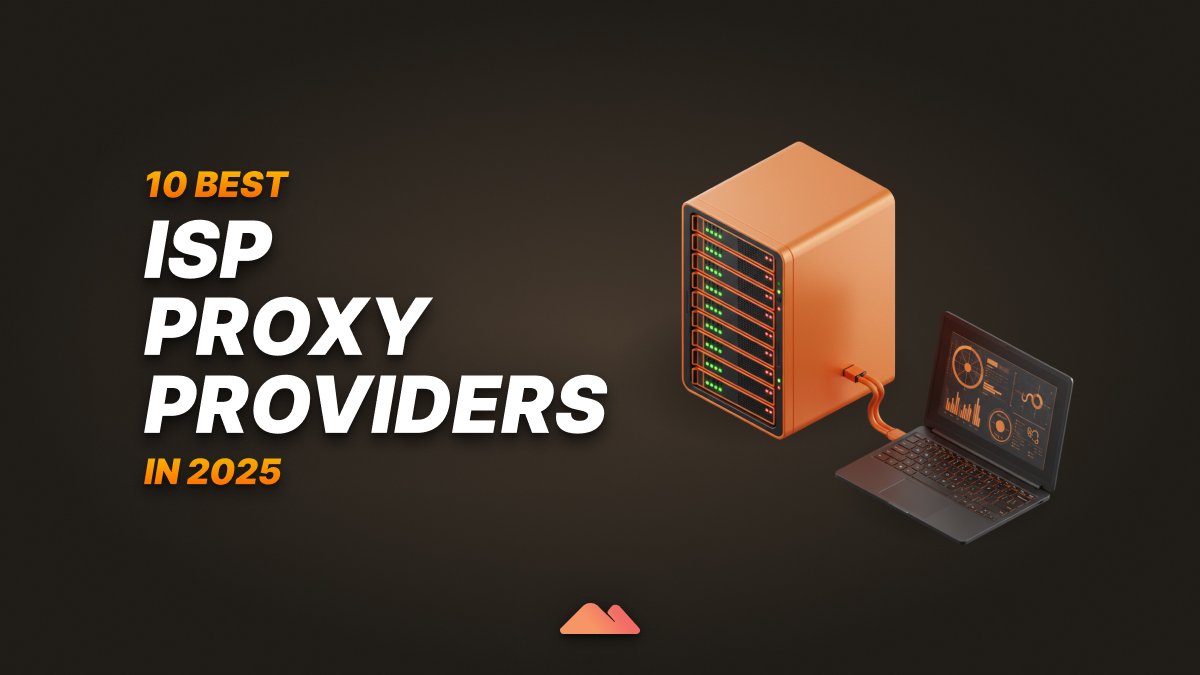The growing need for large-scale data gathering has highlighted the importance of not just speed, but also stealth. Rotating residential proxies have emerged as a key solution for businesses and individuals seeking to collect web data efficiently while minimizing the risk of detection and IP blocks.
This guide breaks down the core concepts of rotating residential proxies, their operational mechanics, various types, significant advantages, and crucial considerations for selecting a provider, while also addressing common pitfalls.
Let's dive in!
What Is a Rotating Proxy?
Rotating residential proxies are real IP addresses assigned by Internet Service Providers (ISPs) to homeowners. What makes them unique is their ability to rotate—meaning your digital "address" or IP changes automatically at set intervals or after each request.
This rotation helps you appear as different, genuine users accessing a website, massively reducing the likelihood of your IP getting flagged or blocked. Unlike datacenter proxies, which use IPs from servers and are easier for websites to spot and ban, residential proxies blend in with normal user traffic. And unlike static residential proxies, which give you one fixed IP, rotating proxies constantly refresh your IP identity, keeping you one step ahead.
What Is IP Rotation and How Rotating Residential Proxies Work
Rotating residential proxies work by sending your internet requests through a large network (or "pool") of these residential IPs—each one sourced from a real user's device like a smartphone, desktop, or home router. When you connect through one, your IP is either:
- Rotated per request – Every action you take (e.g., loading a page, pulling a product price, clicking a link) gets a fresh IP address.
- Rotated per session (sticky sessions) – You keep the same IP for a fixed amount of time (e.g., 5, 10, or 60 minutes) before it swaps to a new one. This is super useful for tasks like logging into an account or completing a multi-step checkout process, where changing IPs mid-way would cause errors.
This method of IP rotation mimics organic, human-like behavior, allowing for high-volume data gathering without triggering those pesky anti-bot systems. It’s a critical technique for staying anonymous and avoiding IP-based restrictions or "rate limits."

Key Benefits of Using Rotating Residential Proxies
Rotating residential proxies offer a wide range of advantages that go beyond basic IP masking. These benefits make them a critical component in any operation that relies on stable, undetectable, and scalable internet access.

True Residential IP Anonymity
Every proxy in the rotation is a real residential IP, meaning it comes from a legitimate user’s internet connection (like an Airtel or Jio fiber line). This makes your requests look completely authentic, not from a server or bot, significantly reducing the chances of being flagged or banned.
Automatic IP Rotation Without Manual Intervention
Rotating residential proxies automatically switch IP addresses per request or based on session time. This eliminates the need to manually manage proxy pools and improves operational efficiency by handling rotation logic at the network level.
Resistance to Detection Mechanisms
Unlike datacenter proxies, residential IPs aren’t easily recognized by anti-bot systems. The rotating nature further enhances stealth, making it nearly impossible for websites to detect scraping behavior or block your access based on patterns.
High Session Success Rates
With rotating proxies, you minimize failed requests due to IP bans or rate limits. A fresh IP for each connection ensures consistent access, translating into fewer retries, faster scraping cycles, and reduced risk of service disruptions.
Scalable Infrastructure for Large-Volume Requests
Rotating proxy infrastructures are built to handle a high throughput of requests without tripping alarms. This makes them suitable for scaling operations efficiently, from small batch runs to enterprise-level data extraction and analysis.
Geo-Diversity and IP Pool Size
Top providers offer access to high-quality IPs distributed across multiple countries, cities, and ISPs. Good geo-targeting combined with genuine IP diversity (across different subnets and ISPs) ensures better traffic distribution, minimal IP reuse, and lower chances of being rate-limited or flagged in specific regions.
Fast and Stable Connection Performance
Well-optimized rotating networks deliver low-latency, high-bandwidth connections. With average response times often under 1 second and 99%+ uptime, rotating residential proxies support smooth, high-speed workflows without bottlenecks.
Reduced Fingerprinting Risk
Advanced anti-bot systems use device and browser fingerprinting to detect bots. Rotating residential proxies help you rotate IPs while pairing with anti-detect browsers or headless automation tools, making it harder to tie multiple actions to a single identity.
Easy Integration and API Access
Rotating proxies are typically compatible with HTTP(S) and SOCKS5 protocols, and they integrate easily with automation frameworks, web browsers, scraping libraries, and no-code tools—speeding up deployment.
Ethically-Sourced and Legally Safer
When purchased from a reputable provider, residential proxies are sourced from opt-in users via partnerships or apps. This makes them a more compliant and legally sound alternative to shady P2P or compromised networks.
Use Cases for Rotating Residential Proxies
Rotating residential proxies are a foundational tool for businesses and professionals operating in environments that demand scale, stealth, and global access. Below are the most common and impactful use cases:

Web Scraping and Data Extraction
Collect large volumes of publicly available data from websites without triggering anti-bot systems. Rotating IPs ensure that your scrapers avoid detection, IP bans, and rate limits while pulling accurate, fresh data at scale.
Price Aggregation and Market Intelligence
Monitor pricing, product listings, and competitor strategies across eCommerce platforms. Rotating proxies help simulate real user behavior, enabling clean access to localized pricing data and avoiding dynamic pricing triggers.
SEO Monitoring and SERP Tracking
Track keyword positions, ad placements, and organic rankings from multiple locations. By rotating through IPs from specific cities or countries, you get accurate SERP snapshots and unbiased results tailored to your geo-targeting strategy.
Ad Verification and Compliance Monitoring
Ensure that your digital ads appear correctly and aren't hijacked or misrepresented. Rotating residential proxies allow you to verify ads from various regions, detect fraudulent placements, and validate geo-targeted campaigns.
Brand Protection and Anti-Counterfeiting
Identify counterfeit listings, unauthorized resellers, or fake social profiles across platforms. Proxies enable anonymous browsing and access to cloaked content, helping your team enforce brand rights without revealing your identity.
Travel Fare and Real Estate Monitoring
Track airfare, hotel rates, or housing availability across multiple locations. Many of these websites use dynamic pricing or A/B testing based on visitor IPs—rotating residential proxies ensure you're seeing unbiased listings.
Social Media Automation and Intelligence
Manage multiple accounts, monitor trends, and collect public sentiment across platforms like Instagram, TikTok, or Twitter. Rotating IPs reduce the risk of bans and allow for smooth, large-scale automation and analytics.
App Testing and QA Across Regions
Test websites and mobile apps from different user perspectives by rotating IPs to specific geos or ISPs. This is essential for localizing user experiences and debugging region-specific issues.
Types of Rotating Proxies
There are three primary types of rotating proxies, each with distinct characteristics, unique features, and benefits: rotating residential proxies, rotating datacenter proxies, and rotating mobile proxies.
Rotating Residential Proxies
Rotating residential proxies use IP addresses assigned to real residential devices (such as desktops and mobile devices) by Internet Service Providers (ISPs). Since residential proxies appear as regular home users, they are less prone to IP blocks and less likely to be flagged by websites. However, rotating residential proxies often come with higher costs and slower speeds compared to other options.
Rotating residential proxies are a versatile tool, ideal for a wide range of tasks including web scraping, social media management, market research, ad verification, and bypassing geo-restrictions. Their ability to mimic regular home users makes them a valuable and flexible option.
Rotating Datacenter Proxies
Originating from data centers worldwide, datacenter proxies deliver high speeds and reliability. Each IP address is assigned by the third-party cloud service provider. They are usually faster than residential proxies and are often cheaper.
Datacenter proxies are well-suited for tasks requiring large-scale operations without the need for location accuracy and rapid data processing, such as market research, web browsing, entertainment, and enhancing online security.
Rotating Mobile Proxies
Rotating mobile proxies assign you an IP of, you've guessed it, a mobile device, such as a cell phone or a tablet. Of all the types of proxies, mobile proxies give the most anonymity as they have close-to-zero chances of being detected. Because of this, generally, they are also more expensive.
It's important to note that the use of rotating mobile proxies requires multiple mobile IP addresses for rotation, which can lead to a higher cost. Additionally, the speed of mobile proxies may be slower if the user sharing the network is using mobile data instead of Wi-Fi. These factors make rotating datacenter and residential proxies a more cost-effective and faster choice for most business and personal web scraping needs.
Mobile rotating proxies are highly effective for tasks requiring the simulation of mobile user behavior, such as app testing and mobile ad verification.
Choosing the Best Rotating Residential Proxies
With many providers on the market, choosing the right one is key to operational success. Here’s what to consider:
1. IP Pool Size and Diversity
Focus on Active Quality, Availability & Diversity, Not Just Advertised Millions. Providers love to boast about having 50 million, 70 million, or even more IPs. Be skeptical! This often refers to the total number of unique IPs that have ever passed through their network over years, not what's actually online and available for you right now. Learn more: How Many IPs Do You Really Need?
2. Session Control and Rotation Modes
Your provider should let you switch between per-request rotation and sticky sessions, depending on task complexity.
3. Advanced Geo-Targeting
Make sure you can choose IPs by country, state, city, or ZIP code. ASN-level targeting is a bonus.
4. Network Speed and Reliability
Check for average response times under 1 second, 99%+ success rates, and stable uptime across all regions.
5. Protocol Support (HTTP/S, SOCKS5)
Ensure compatibility with your tools and systems. SOCKS5 support is especially useful for performance-sensitive workflows.
6. Legal and Ethical Transparency
Only work with providers who source IPs from opt-in users. This protects your reputation and avoids compliance risks.
7. Integration and Developer Tools
Your proxy network should offer a simple dashboard, API access, documentation, and integration guides for your tech stack.
When selecting a proxy provider, it's important to prioritize reliability, speed, and ethical sourcing. Massive offers a 100% ethically-sourced residential proxy network built for seamless data gathering and robust IP protection. Our rotating residential proxies provide access to top global locations, helping you bypass IP bans and maintain uninterrupted data collection.
Massive supports both rotating and sticky sessions, along with HTTP(S) and SOCKS5 protocols, precise geo-targeting options, and unlimited concurrent connections—giving businesses the flexibility to scale operations efficiently and securely.
Buyer’s Checklist: What to Look For
Use this checklist to quickly evaluate proxy providers:
✅ Sufficient pool of active, high-quality IPs with good subnet diversity in your target locations
✅ Sticky and rotating session control
✅ Country/city/ASN targeting
✅ <1 second average response time
✅ HTTP(S) & SOCKS5 support
✅ 99%+ success rate
✅ Ethically-sourced residential IPs
✅ Developer-friendly API and documentation
Common Mistakes When Using Rotating Proxies
Even experienced users can run into issues if rotating proxies aren’t configured correctly. Below are some of the most common mistakes, along with explanations on how to avoid them:
❌ Rotating too frequently on session-based sites (e.g., during logins)
If you're scraping a site that uses cookies, sessions, or requires login, rotating the IP per request can break continuity. This can cause logouts, empty responses, or failed multi-step workflows.
✅ Solution: Use sticky sessions to maintain the same IP for a few minutes during login flows, checkout processes, or multi-page crawls.
❌ Not enabling sticky sessions when needed
Some sites validate IP consistency to protect against bots. If you switch IPs mid-session without maintaining cookies or headers, your session can reset or throw errors.
✅ Solution: Choose a provider that supports session persistence (e.g., 5 or 10 minutes) and use it strategically for logged-in scraping, paginated content, or account simulations.
❌ Overusing the same subnet or location
Even with a large IP pool, if you target the same region too aggressively (e.g., 10,000 requests from New York), websites may detect the pattern and start blocking or rate-limiting IPs from that subnet.
✅ Solution: Distribute requests geographically or throttle requests per region. Rotate not only IPs but also locations when possible.
❌ Not rotating browser headers or user-agents
If you're using the same browser fingerprint with different IPs, anti-bot systems can detect the mismatch. Rotating proxies alone won’t help if your device fingerprint is static.
✅ Solution: Combine proxies with browser fingerprint rotation tools or anti-detect browsers. Make sure user-agents, languages, screen sizes, and referrers also vary.
❌ Ignoring proxy limits—some platforms throttle high-frequency IP changes
Some providers have caps on concurrent sessions, bandwidth, or request frequency. Exceeding these can lead to IP bans or connection drops.
✅ Solution: Monitor your usage through the provider’s dashboard or API. Set up throttling or queuing in your scraper to stay within quota limits.
Avoid these traps to maximize performance and minimize bans.
Conclusion
Rotating proxies are a powerful tool for scalable solutions, offering increased security and anonymity. By understanding the different types of rotating proxies, their benefits, and the top providers, you can make an informed decision when choosing a rotating proxy service.
Now, you've got the lowdown on rotating proxies. They can be a real game-changer for staying under the radar, getting around those geo-blocks, and making your online life a bit smoother. But remember, not all proxies are created equal. You need to find a rotating proxy provider that is speedy, reliable, and doesn’t put your privacy at risk.

I am the co-founder & CEO of Massive. In addition to working on startups, I am a musician, athlete, mentor, event host, and volunteer.
Customer reviews
Frequently Asked Question
What is a rotating proxy?
+
A rotating proxy is a proxy server that automatically assigns a new IP address from a pool each time you make a request or after a set time interval. This rotation helps mask your identity, reduce detection, and bypass rate limits on websites.
What is IP rotation?
+
IP rotation is the process of changing your IP address at regular intervals or per request. It’s commonly used in web scraping, SEO tools, and ad verification to simulate different users and avoid bans or blocks.
How to rotate an IP address?
+
The easiest way to rotate your IP address is by using a proxy provider that offers automatic rotation. You can set up per-request rotation or sticky sessions through your provider’s dashboard or proxy configuration settings. No manual switching is needed—rotation is handled at the network level.
Are rotating proxies legal?
+
Yes, rotating proxies are legal when used for ethical and permitted purposes, such as collecting publicly available data, monitoring ads, or performing competitive research. Always ensure your provider sources IPs with user consent and complies with data privacy laws.










